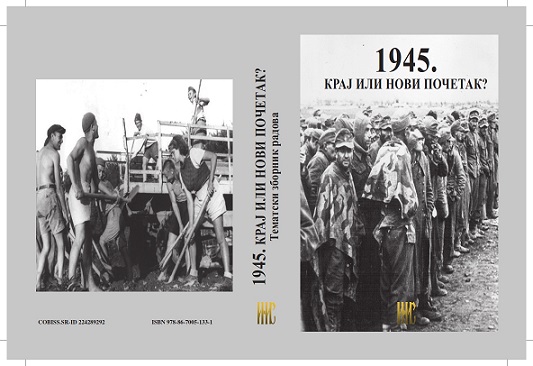Ишчекивање судбине и нови почеци: прилози истраживању историје српске колаборационистичке емиграције у првим годинама после Другог светског pata
Awaiting the Fate and New Beginnings: A Contribution to the Research of the History of Serbian Collaborationist Emigration in the First Years after WWII
Author(s): Aleksandar Stojanović
Subject(s): International Law, Human Rights and Humanitarian Law, Military history, Political history, International relations/trade, Politics and law, WW II and following years (1940 - 1949)
Published by: Institut za noviju istoriju Srbije
Keywords: refugees; collaborationists; Zbor; Chetniks; Eboli; Munster; Epsilon; McLean's commission; repatriation;
Summary/Abstract: During the last military operations of WWII some 70,000 members of various Yugoslav collaborationist forces and their families surrendered to the British and American authorities. At first they were allotted the status of “surrendered enemy personal” and later on of “displaced persons” under temporary care of international humanitarian organizations and the British Army and the Screening Commission. The new Yugoslav authorities demanded extradition of almost all Yugoslav citizens under control of the Allied military authorities. As a matter of fact, the number of real war criminals among the DPs (especially among the ustasha, members of the Zbor of Dimitrije Ljotić, Slovenian collaborationists, but also among the chetniks and Croatian home guards) whose guilt could easily be proven, was considerable. However, the way the new Yugoslav regime dealt with both collaborationists and war criminals and with other political and ideological enemies, went beyond the stipulations of the rule of law and of law of nations. Together with the increasing Cold War tensions, this contributed significantly to the siding of the larger part of the public and most political forces of the Western countries with the people who pleaded respect for the law of nations and for basic human rights, demanding protection from forcible repatriation. Conservative political forces and media, as well as various religious organizations strove to depict the collaborationists of yesterday as anticommunists and model Christians, whereas the disproportionate oppression of the new Yugoslav regime during the first months and years after the war provided them with enough material to argue before the world public that no-one extradited to Tito could hope to have a fair trial in Yugoslavia. American and British diplomatic reports confirmed this, so the question of extradition of DPs became, together with the question of Trieste, the main bone of contention in the relations between Tito and Yugoslavia with their former wartime allies. Desirous of solving this unpleasant question as soon as possible, but also of convincing Tito in their good intentions, the British authorities entrusted brigadier Fitzroy McLean with screening Yugoslav collaborationist refugees. After more than a year of work his commission decided that out of several thousand people, some forty were to be extradited: the Cold War atmosphere, infringements of human rights in the socialist Yugoslavia, but also fatigue and pressure of the British public opinion to get the affair off the agenda enabled many collaborationists whose guilt was indisputable, to avoid trial and to acquire permanent status of (political) refugees. Since 1947, as most of the emigre Serbian collaborationists had acquired refugee status, a new phase in the life of the Serbian emigration started. At prodding of Jakov Ljotić, the leader of the Zbor movement, most of his adherents applied for work and stay in Great Britain, from where certain groups moved to the USA, Canada and Australia. Former members of the chetnik units usually settled down in England and in the USA, although some chetniks and members of the Zbor preferred to stay in Western Germany and start a new life there. Although research has so far shown that the Serbian (and Yugoslav) emigration was disunited and often prey to internal strife, it was unquestionably united in an anti-communist front. It comprised a permanent public campaign against Tito and the Yugoslav authorities, diplomatic intriguing aimed at destabilizing the regime in Yugoslavia, and in several cases even terrorist actions. For these reasons the emigrants were often targeted by Yugoslav intelligence and security services and their conflict with these services lasted to all intents until late 1980s and the bloody break-up of Yugoslavia that ensued.
Book: 1945. Kpaj или нови почетак?
- Page Range: 339-374
- Page Count: 36
- Publication Year: 2016
- Language: Serbian
- Content File-PDF

